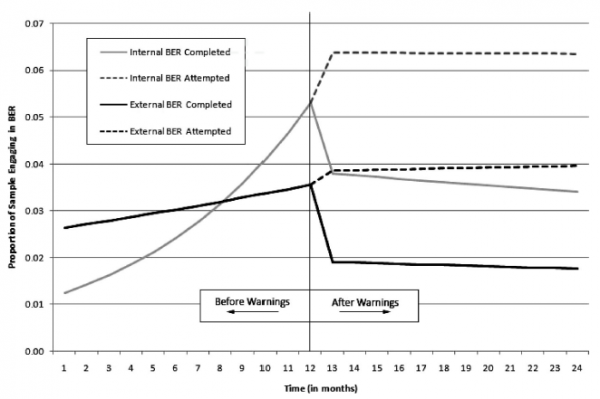Combatting Lying on Personality Tests with Interactive Warnings
![]() A recent article by Landers, Sackett and Tuzsinki1 investigated the degree to which 32,311 managerial applicants at a nationwide retailer completed a personality test for promotion to or selection into the position. Up to 6% of the sample (nearly 2000 applicants) distorted their responses on the personality test by responding with only the extreme ends of the scale, a phenomenon the authors labeled “blatant extreme responding” (BER). The percentage of applicants responding with BER dropped about 2% after an interactive warning was implemented.
A recent article by Landers, Sackett and Tuzsinki1 investigated the degree to which 32,311 managerial applicants at a nationwide retailer completed a personality test for promotion to or selection into the position. Up to 6% of the sample (nearly 2000 applicants) distorted their responses on the personality test by responding with only the extreme ends of the scale, a phenomenon the authors labeled “blatant extreme responding” (BER). The percentage of applicants responding with BER dropped about 2% after an interactive warning was implemented.
The logic of the applicants’ response strategy is appreciated. On a multiple-choice personality survey, one approach to maximize your score might be to respond only “strongly agree” or “strongly disagree” – in effect, the extreme responses. By identifying which answer was “best,” an applicant could get the maximum possible score on such a test. It’s important to note though that not all tests are scored like this; there are many where BER would result in a very low score.
In this study, applicants were both internal (lower-level managers applying for promotions) and external (applicants from outside the organization). Among the internal applicants, a rumor spread among managers that BER would help them beat the test. This resulted in an increase in BER over the first 12 months that the test was available.
At the 12-month mark, the organization implemented an interactive warning – a process only possible in online testing. If BER was detected on the first page of the personality test, a warning popped up. This was successful in reducing the rate of BER at test completion (see the difference between the dashed and solid lines in the figure above).
So, the takehome? The authors describe a real-world setting in which applicants lied on a personality test. This lying was detectable, and warnings reduced the effect. If you’re implementing online personality testing, maybe you should use warnings too!
- Landers, R., Sackett, P., & Tuzinski, K. (2011). Retesting after initial failure, coaching rumors, and warnings against faking in online personality measures for selection. Journal of Applied Psychology, 96 (1), 202-210 DOI: 10.1037/a0020375 [↩]
| Previous Post: | Survey Provider and Sponsor Reputation Influence Survey Participation |
| Next Post: | LinkedIn Profiles Contain Fewer Lies Than Resumes |
